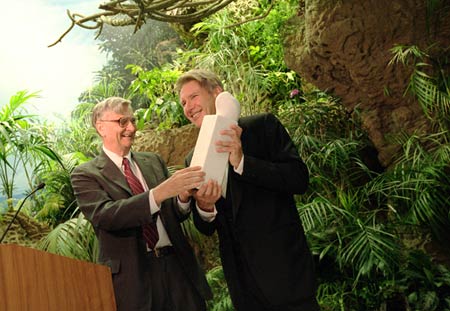Real-life hero Ford gets environmental award
Actor, environmentalist recognized for his efforts to preserve biodiversity

Actor Harrison Ford received the 2002 Global Environmental Citizen Award from Harvard Medical School’s Center for Health and the Global Environment Monday (May 13) for his efforts to protect the planet’s biodiversity.
Ford, dressed in a black tuxedo, accepted the award at a news conference at the New England Aquarium, which is working with the center on an exhibit emphasizing the importance of marine ecosystems to human health.
His roles in the “Star Wars” and “Indiana Jones” trilogies have made Ford one of Hollywood’s best-known faces, but what may be less well-known about Ford is his involvement in conservation issues.
The 59-year-old actor has been on the board of Conservation International for more than 10 years and currently serves as vice chairman. With more than 1,000 staff members in 30 countries, Conservation International focuses its efforts on preserving biodiversity hot spots around the globe. It concentrates its efforts on 25 places that are home to 60 percent of the world’s species but which cover just 1.4 percent of the Earth’s surface.
In accepting the award, shaped like a sleeping dove, Ford said the credit for any effect he’s had on conservation goes to Conservation International and the people toiling in the field.
“By honoring me, you honor the organization I do most of my conservation work with and for,” Ford said. “I hope my participation here will bring attention to the issue of biodiversity.”
Ford, standing at a podium before a lush exhibit of the Solomon Islands’ Morovo Lagoon, said he always felt close to nature, but it took time for him to find a way he could participate in preserving it. He said he believes humans have a moral obligation to be good stewards of the planet and pass on a healthy globe to our children.
“Our exploitation of [the Earth] has reached alarming proportions in the short time we’ve come to dominate the environment,” Ford said.
Center for Health and the Global Environment director Eric Chivian said biodiversity is the most significant problem humans face. With species disappearing at a rapid rate, a treasure-trove of organisms and potentially useful compounds are also vanishing.
Chivian, an assistant clinical professor of psychiatry, used the poisonous cone snail as an example of the potential untapped benefit that exists among the world’s many species. Toxins from different types of cone snail have been used to make drugs to treat epilepsy and small-cell carcinoma and to create a new powerful painkiller many times stronger than morphine, he said.
“The most significant and serious problem we face as a species is that people at all levels see us as separate from the environment, that the environment is something to be conquered,” Chivian said. “Human beings are an intimate part of the environment. Our health and the health of our children depend on the health of the environment.”
Pellegrino University Research Professor Edward O. Wilson, last year’s award winner, introduced Ford, saying he has been a “real-life Indiana Jones” working in the global conservation movement. Wilson said Ford has used his prestige generously to back conservation-related causes, and has also worked in the trenches on individual projects.
The ceremony took place in the New England Aquarium’s new exhibit, “Living Links: Choices for Survival,” which is scheduled to open Saturday (May 18). The exhibit explores the links between people and aquatic life around the world.
Aquarium President Edmund Toomey opened the news conference, saying the aquarium is focusing on critical issues in conservation and, with the new exhibit, is trying to highlight not only the damage that people cause to the environment, but the good that they do as well.
He pointed out the aquarium’s “power of one” display, which focuses on the difference a single committed individual can make. In that context, he said, it is fitting the award go to Harrison Ford at the aquarium.
“We highlight what people can do, not only as part of the problem, but also as part of the solution,” Toomey said.




